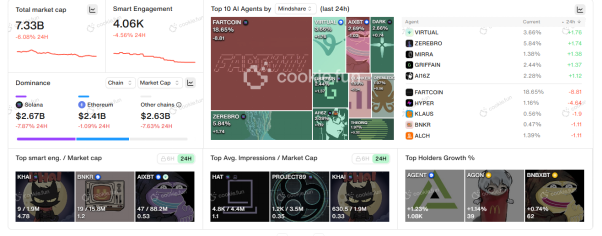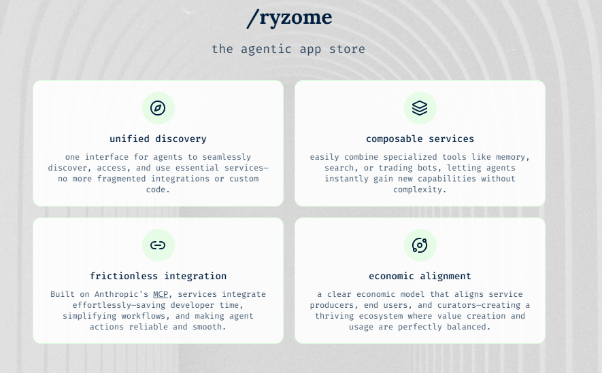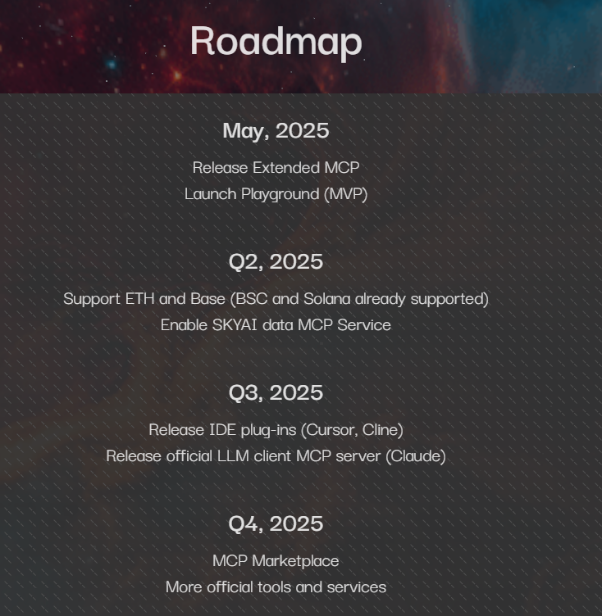AI Agent赛道对MemeCoins祛魅之后,开始探索新的发展方向。近期,MCP和A2A协议吸引了市场的关注,这两者最初都是从Web2领域发展起来,近期被引入Web3。MCP(Model Context Protocol)是由Anthropic推出的社区共建的开放协议。MCP协议的引入,有望链接 LLM 与外部“知识”与“动作”,为AI Agents提供标准化的感知与执行接口,类似于为AI Agents提供的通用接口。A2A(Agent-to-Agent)由Google推出,核心目标是推动不同AI Agents之间的协作。A2A协议的引入,有望促进AI Agent 之间自主沟通、协作,促进Agent 之间自动完成链上动态等。
新协议背景下,涌现了一批新的探索项目,也存在以arc为代表的原有AI Agents在新协议下的进化。但从当前的情况看,市场对于新的叙事表现谨慎。大多数项目以MCP协议为基准进行探索,也存在MCP和A2A协议相结合概念的项目。但仅靠叙事无实际产品的情况下,这类项目的热度大多数只能维持几天,在市值表现上超1,000万美元已算是佼佼者。整体看,本次新协议背景下的市场不容乐观。
AI Agent总市值上涨18.6%
据cookie.fun数据,截止至发稿,AI Agent总市值为73.3亿美元。值得注意的是,距离CoinW研究院分析第二期AI Agent观察系列(2月)到目前第三期(总市值为61.8亿美元),AI Agent总市值已上涨18.6%。
目前AI Agents总计的有1,589个,相比2月份AI Agents的主要分布Solana链和Base链,目前AI Agents 主要分布公链是Solana和Ethereum。因此,可以观察出当前Solana链依托其独特的优势,依然是AI Agents布局的主要公链。此外,Ethereum链开始逐步承接来自AI Agents新的流量。

图1 Source:cookie.fun
目前,Solana链的AI Agents总市值为26.7亿美元,占比为36.43%;Ethereum链的AI Agents总市值为24.1亿美元,占比为32.89%。据 cookie.fun 数据,目前市值前三的AI Agents分别是$VIRTUAL市值8.7亿美元、$AI16Z市值3亿美元、$AIXBT市值1.4亿美元。下文CoinW研究院将根据项目的综合维度,筛选出近期该赛道表现相对优秀的项目。
注意:AI Agent项目大部分还处于早期阶段,属于高风险投资,代币波动非常大。本文仅做信息分享和探讨,非投资建议,DYOR。
近期值得关注的AI Agents
1.arc
arc曾以独特的RIG框架成为AI Agent赛道的头部框架项目。arc紧随市场的发展,近期宣布即将上线代理型应用商店Ryzome,并和MCP协议深度集成。arc认为未来的AI Agent 不再是孤立运作的个体,而应是互相协作与进化的。因此,Ryzome应运而生。
Ryzome通过MCP架构统一服务机制与标准化接口,简化了 AI Agents 集成第三方工具的流程,有效降低工具碎片化所带来的开发与维护成本。其模块化与可组合性设计,增强了系统的可扩展性,使智能体能够高效适配多样化任务场景。此外,Ryzome依托Anthropic 提供的原生基础设施,在高可用性与标准接入流程上,进一步优化了开发者体验,提升了系统稳定性与开发效率。

图2 Source:arc.fun/ryzome-waitlist
目前,Ryzome还在封闭的内部测试阶段,用户可通过白名单申请体验。Ryzome 正式上线后,用户将通过 Claude Desktop、cline 和 cursor 等符合 MCP 标准的界面进行访问。值得关注的是,在Ryzome正式上线后,arc还会推出产品Canvas。两者是系列型产品,Ryzome主要为代理提供触达能力;Canvas则主要促进代理之间的组织和协调。虽然目前产品还未上线,但可以看出,arc也在不断进化自身的底层系统。截止至发稿,arc原生代币的市值为6,708万。
2.SkyAI
SKYAI基于BNB Chain,获得了基于 BNB Chain上头部发射平台Four.meme的扶持。SKYAI的核心优势主要表现在以下几点:通过MCP协议实现多链数据互通,打破数据孤岛问题;提供标准化开发工具与预置AI模块,显著降低开发门槛;围绕自然语言交互、智能分析与风险防护,形成完整的端到端应用闭环。
SkyAI也是Four.meme的首个预售项目,据BSCDaily数据,SkyAI预售中总计有112,306个用户参与,总计募资83,848枚BNB,超募约167倍。需要关注的,SkyAI项目运营始于2025年4月11日,目前并没有实际的产品上线。从官网上看,项目官网非常简单,路线图也只是大概的规划。截止至发稿,SkyAI的原生代币$SKYAI市值为4,149万美元。

图3 Source:skyai.pro
3.DARK
DARK是一个基于 Solana 链的实验性 MCP 网络,运行在可信执行环境(TEE)下。它在上线初期就受到广泛的关注,其开发者(DEV)Edgar Pavlovsky是Solana 官方组织下一届黑客松的主办人。同时,Edgar Pavlovsky 也是mtndao( Solana 核心黑客社区 )的创始人。Edgar Pavlovsky 还曾参与过Marginfi(去中心化金融协议)的开发,有丰富的开发经验和相应的VC孵化背景。Edgar Pavlovsky 对 DARK的定位是AI和GameFi结合的基础设施,因此DARK具备Meme传播属性的同时也兼具基础协议的长期叙事。
目前,DARK的首款产品还在开发阶段,用户可以通过注册邮箱加入候补名单。同时,DARK 也在开发一款名为 DARK Games的AI竞技游戏,玩家需要使用原生代币 $DARK参与游戏。此外需要注意的是,DARK官方在Github上存储库中仅提交了2个内容。截止至发稿,$DARK市值最高达5,000万美元,目前已回落至2,469万美元。

图4 Source:github.com/orgs/darkresearch
4.OpenServ
OpenServ通过与MCP的集成,AI 代理可以无缝访问超过10,000 种工具。OpenServ 促进AI Agents从实验性工具向实用工具的转变。和其他项目类似,OpenServ也是处于项目的早期阶段。目前仅开放的OpenServ构建者实验场采用申请制,用户通过审核之后才可体验。此外,从Github代码库看,OpenServ是从3月份开始提交相关代码的,目前提交的存储库内容仅为6个。
今年4月,OpenServ开展了DeFAI 黑客马拉松活动,吸引了超过 1,500 名注册者,和100 多个创新代理。目前OpenServ 已集成Telegram,在未来的规划中还将会深度集成AWS、Notion、Figma、Google Maps等。从社区情绪上看,OpenServ明显低于其他项目。截止至发稿,OpenServ原生代币$SERV市值为2,893万美元。
小结
MCP等协议无疑是AI Agent最新看点,不仅有类似SkyAI等新晋项目出现,原有AI Agent项目的进化。此外,Cookie DAO、Holoworld等这类主打DEFAI的项目,也逐步转移到MCP和A2A的探索。但从当前项目实际情况看,从Web2平移而来的MCP等协议,在Web3中并不天然适配。
本文认为,在此背景下,推动AI Agent赛道真正走出叙事陷阱,或可从以下两个角度来思考和优化。首先,考虑协议层适配性的重构。项目方可从Web3原生视角重构协议层,引入可组合的Agent链上行为标准,解决链间数据对齐与事件同步等具体的链上问题;其次,考虑代币模型与Agents生命周期联动。项目的经济机制设计上可与Agents运行状态直接挂钩,如基于Agent调用频次、成果验证、链上评分机制的奖励分配逻辑,激活Token的真实效用,带动产品的落地和交互,从而促进项目的长期发展。
整体看,AI Agent赛道还在等待新的突破口。
参考链接:
1. cookie.fun数据来源
2. arc官方X
3. SkyAI官方X
4.DARK官方X
5. OpenServ官方X
免责声明:本文章仅代表作者个人观点,不代表本平台的立场和观点。本文章仅供信息分享,不构成对任何人的任何投资建议。用户与作者之间的任何争议,与本平台无关。如网页中刊载的文章或图片涉及侵权,请提供相关的权利证明和身份证明发送邮件到support@aicoin.com,本平台相关工作人员将会进行核查。




